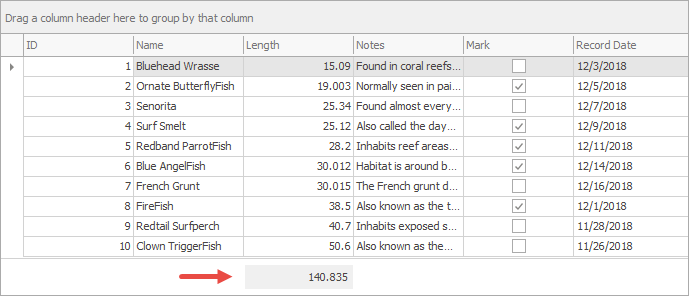GridView.CustomSummaryCalculate Event
Allows custom summary value calculation. Fires for summary items with SummaryType set to SummaryItemType.Custom.
Namespace: DevExpress.XtraGrid.Views.Grid
Assembly: DevExpress.XtraGrid.v25.2.dll
NuGet Packages: DevExpress.Win.Grid, DevExpress.Win.Navigation
Declaration
Event Data
The CustomSummaryCalculate event's data class is CustomSummaryEventArgs. The following properties provide information specific to this event:
| Property | Description |
|---|---|
| FieldValue | Gets the processed field value. |
| GroupLevel | Gets the nested level of the group whose summary value is being calculated. |
| GroupRowHandle | Gets a value identifying the group row whose child data rows are involved in summary calculation. |
| IsGroupSummary | Gets whether a group summary value is being calculated. |
| IsTotalSummary | Gets whether a total summary value is being calculated. |
| Item | Gets a summary item whose value is being calculated. |
| Mode | Specifies how summaries are calculated - against all rows or for the selected rows. |
| Row | Gets the currently processed row. |
| RowHandle | Gets the handle of the processed row. |
| SummaryProcess | Gets a value indicating calculation stage. |
| TotalValue | Gets or sets the total summary value. |
| TotalValueReady | Gets or sets whether the Calculation stage of the custom summary calculation process should be skipped. |
The event data class exposes the following methods:
| Method | Description |
|---|---|
| GetGroupSummary(Int32, Object) | Returns the value of the specified group summary for the specified group row. |
| GetValue(String) | Returns the value in the specified field |
Remarks
The GridControl calculates predefined summary types (for example, MAX, MIN, COUNT, AVG, etc.) automatically. To implement custom summary logic, handle the CustomSummaryCalculate event.
Note
A summary is treated as custom if its GridSummaryItem.SummaryType property equals to SummaryItemType.Custom.
The grid raises the CustomSummaryCalculate event in three stages:
Start
The event fires with the
e.SummaryProcess == CustomSummaryProcess.Start. Use this stage to initialize the e.TotalValue parameter.Calculate
The event fires once for each data row (in total summaries) or group row (in group summaries), with
e.SummaryProcess == CustomSummaryProcess.Calculate. Usee.RowHandleande.FieldValueto access the row and value. Updatee.TotalValueaccordingly.Finalize
After processing all rows, the event fires with
e.SummaryProcess == CustomSummaryProcess.Finalize. Use this stage to finalizee.TotalValue.
See the following help topic for more information: Working with Summaries in Code. Custom Summaries.
Specific Notes
Server Mode
In Server Mode, the CustomSummaryCalculate event fires only once with e.CustomSummaryProcess == CustomSummaryProcess.Finalize. The event does not process individual data rows. Assign the final value to e.TotalValue directly.
gridView1.CustomSummaryCalculate += (obj, e) => {
e.TotalValueReady = true;
e.TotalValue = 100;
};
Summary Field Not Represented by a Grid Column
If the summary item references a data field that is not displayed in the grid (for example, no column is bound to this field), the CustomSummaryCalculate event fires only twice — once with CustomSummaryProcess.Start and once with CustomSummaryProcess.Finalize. The CustomSummaryProcess.Calculate stage is skipped, as the grid does not iterate through data rows.
Example
The example below creates a new custom summary items and populates it on the GridView.CustomSummaryCalculate event. You can test this sample in our DevExpress Demo Center (the link requires Demo Center of version 16.2 or newer to be installed).

The custom summary item is located under the “Length” column. To add it, set up the GridColumn.SummaryItem property.
gridView.OptionsView.ShowFooter = true;
GridColumn column = gridView.Columns["Length"];
column.SummaryItem.SummaryType = SummaryItemType.Custom;
The CustomSummaryCalculate event handler checks the current calculation state by reading the CustomSummaryEventArgs.SummaryProcess value. Cell values are added to the total sum only if the corresponding cell under the “Mark” column is checked.
double sum = 0;
gridView.CustomSummaryCalculate += (sender, e) => {
GridView view = sender as GridView;
if (e.IsTotalSummary && (e.Item as GridSummaryItem).FieldName=="Length") {
GridSummaryItem item = e.Item as GridSummaryItem;
if (item.FieldName == "Length") {
switch (e.SummaryProcess) {
case CustomSummaryProcess.Start:
sum = 0;
break;
case CustomSummaryProcess.Calculate:
bool shouldSum = (bool)view.GetRowCellValue(e.RowHandle, "Mark");
if (shouldSum) {
sum += (double)e.FieldValue;
}
break;
case CustomSummaryProcess.Finalize:
e.TotalValue = sum;
break;
}
}
}
};
To automatically update the summary item when users check or clear the “Mark” column checkboxes, the GridView.UpdateTotalSummary method is called on the RepositoryItem.EditValueChanged event.
RepositoryItemCheckEdit edit = gridView.Columns["Mark"].RealColumnEdit as RepositoryItemCheckEdit;
edit.EditValueChanged += (sender, e) => {
//Post an editor's value to a data source
gridView.PostEditor();
//Force calculation of the total summary
gridView.UpdateTotalSummary();
};
The code below is a complete example code.
// Handle this event to calculate summary values manually
double sum = 0;
gridView.CustomSummaryCalculate += (sender, e) => {
GridView view = sender as GridView;
if (e.IsTotalSummary && (e.Item as GridSummaryItem).FieldName=="Length") {
GridSummaryItem item = e.Item as GridSummaryItem;
if (item.FieldName == "Length") {
switch (e.SummaryProcess) {
case CustomSummaryProcess.Start:
sum = 0;
break;
case CustomSummaryProcess.Calculate:
bool shouldSum = (bool)view.GetRowCellValue(e.RowHandle, "Mark");
if (shouldSum) {
sum += (double)e.FieldValue;
}
break;
case CustomSummaryProcess.Finalize:
e.TotalValue = sum;
break;
}
}
}
};
gridView.OptionsView.ShowFooter = true;
GridColumn column = gridView.Columns["Length"];
column.SummaryItem.SummaryType = SummaryItemType.Custom;
RepositoryItemCheckEdit edit = gridView.Columns["Mark"].RealColumnEdit as RepositoryItemCheckEdit;
edit.EditValueChanged += (sender, e) => {
//Post an editor's value to a data source
gridView.PostEditor();
//Force calculation of the total summary
gridView.UpdateTotalSummary();
};